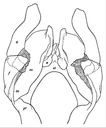Tylobolus
Tylobolus
Classification
- Phylum: Arthropoda
- Subphylum: Myriapoda
- Class: Diplopoda
- Order: Spirobolida
- Family: Spirobolidae
- Genus: Tylobolus
Pronunciation
How to pronounce Tylobolus: /taɪˈloʊbələs/
These audio files are automatically generated. While they are not always 100% accurate, they are a good starting point.
Images




Summary
Tylobolus is a genus of relatively large cylindrical millipedes, predominantly found in western North America, recognized for their distinctive body structure and color patterns. They play an essential role in their ecological niche as decomposers.
Physical Characteristics
Medium to large cylindrical millipedes measuring 36–92 mm long and 5 to 10 mm wide. They have 40 to 54 body rings, with a base color ranging from dark blackish to dull reddish brown, and may have bright red and yellow bands on the posterior margins of each ring. Eyes are widely spaced, with more than twice the width of an eye between them, and consist of a patch of 27-50 ocelli.
Identification Tips
Look for cylindrical shape, distinct color patterns (black to reddish with possible bright markings), and the number of body segments (42-54) for identification.
Habitat
Found on the Pacific Slope of North America, mostly in forests or near moist habitats.
Distribution
All species are located in western North America, ranging from Washington state to Baja California, Mexico, with only T. utahensis occurring east of the Sierra Nevada, in the Mojave Desert.
Diet
Herbivorous, feeding on decaying plant matter and organic material.
Reproduction
Male gonopods are typically concealed within a pouch, indicating a potentially complex reproductive behavior.
Ecosystem Role
Decomposers in the ecosystem, contributing to nutrient cycling by breaking down dead plant material.
Collecting Methods
- Hand collecting in their natural habitats
- Using light traps
Preservation Methods
- Ethanol preservation
- Drying for display
Evolution
Considered to be one of the more advanced genera within the Spirobolidae family, with unique genital morphology and leg structures.
Similar Taxa
Misconceptions
Some individuals may confuse Tylobolus with other common spirobolid species due to overlapping habitat ranges, particularly with Narceus americanus.
Tags
- millipede
- Tylobolus
- arthropod
- decomposer
- Pacific North America